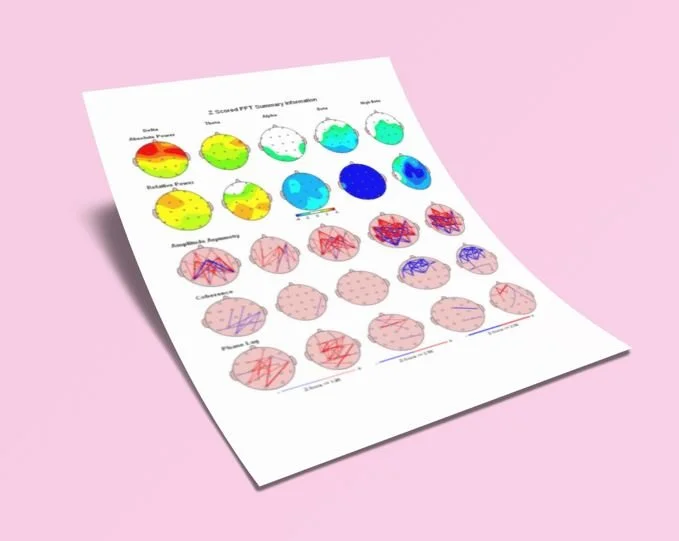What if it's not their personality at all?
It's easy to attribute certain behaviors, emotions, and reactions to personality traits, especially in children.
When a child is overly anxious, frequently inattentive, or exhibits behavioral challenges, we often label them as "high-strung," "easily distracted," or "difficult." But what if these traits are not a fixed part of their personality? What if these reactions are actually a response to how their brain is functioning?
At Brain Train Centers DFW, we believe in looking beyond labels to understand the root causes of emotional, cognitive, and behavioral symptoms. “With advancements in neurofeedback therapy and brain mapping technology, we can gain a clearer picture of what is happening inside the brain and provide effective, non-invasive solutions to help children thrive,” says Sandra Hooper-Murcott, Brain Train DFW Owner.
Understanding the Brain's Functionality
The brain is an incredibly complex organ, responsible for regulating everything from emotions and thoughts to behaviors and bodily functions. Sandra says, “When the brain's electrical activity is out of balance, it can lead to a wide range of symptoms that are often misinterpreted as personality traits. These imbalances can manifest as anxiety, attention deficits, mood swings, impulsivity, and more.”
Brain Maps are a Window into the Brain
Brain mapping, also known as quantitative electroencephalography (qEEG), is a powerful tool that allows us to visualize the brain's electrical activity. By placing sensors on the scalp, we can measure the brain's wave patterns and identify areas of dysregulation. This information is invaluable in understanding how the brain is functioning and where imbalances may be occurring.
A brain map can reveal:
Areas of Overactivity: Excessive activity in certain parts of the brain can lead to symptoms such as anxiety, hyperactivity, and insomnia.
Areas of Underactivity: Insufficient activity in specific regions can contribute to issues like depression, lack of motivation, and attention deficits.
Connectivity Issues: Abnormal connections between different brain regions can result in poor cognitive function, memory problems, and emotional dysregulation.
The Power of Neurofeedback Therapy
Once we have a comprehensive understanding of the brain's activity through a brain map, we can use neurofeedback therapy to train the brain to function more efficiently. Neurofeedback is a non-invasive, drug-free technique that helps the brain self-regulate by providing real-time feedback on its activity.
During a neurofeedback session, sensors are placed on the scalp to monitor brain wave activity. This information is fed into a computer program that displays the brain's activity in real-time. The individual engages in a simple activity, such as watching a movie or playing a game, and the program provides feedback based on their brain wave patterns.
When the brain produces the desired wave patterns, the individual receives positive feedback, such as the movie playing smoothly or the game progressing. When the brain activity deviates from the desired pattern, the feedback changes, prompting the brain to adjust. Over time, this process helps the brain learn to produce healthier patterns, leading to improved function and reduced symptoms.
Two Simple Steps to Start the Journey
If you are concerned about your child's emotional, cognitive, or behavioral symptoms, it may be time to consider brain mapping and neurofeedback therapy. Starting the journey towards improved brain health is easier than you might think.
Step 1: Schedule Your Child’s Brain Map
The first step is to schedule a brain map for your child at one of our Brain Train DFW offices. This initial assessment will provide a detailed picture of your child's brain activity and highlight areas of dysregulation. With this information, we can develop a personalized neurofeedback training plan tailored to your child's unique needs.
Step 2: Start Training with Neurofeedback Therapy
Once we have a brain map, we can begin neurofeedback therapy. Our trained and certified professionals will guide your child through each session, providing support and encouragement as they work towards better brain function. The therapy is designed to be engaging and enjoyable, making it a positive experience for children of all ages.
We are dedicated to helping families find answers and solutions for their children's emotional, cognitive, and behavioral symptoms.
By looking beyond surface-level traits and understanding the brain's functionality, we can provide effective, personalized care that leads to lasting improvements.
If you suspect that your child's behaviors are more than just personality traits, it may be time to explore the possibilities of brain mapping and neurofeedback therapy. With just two simple steps, you can start the journey towards a healthier, happier future for your child.
To schedule your child's brain map or learn more about neurofeedback therapy, contact us online or call us at 972-640-7022. Together, we can unlock your child's full potential and support their journey to optimal brain health.





